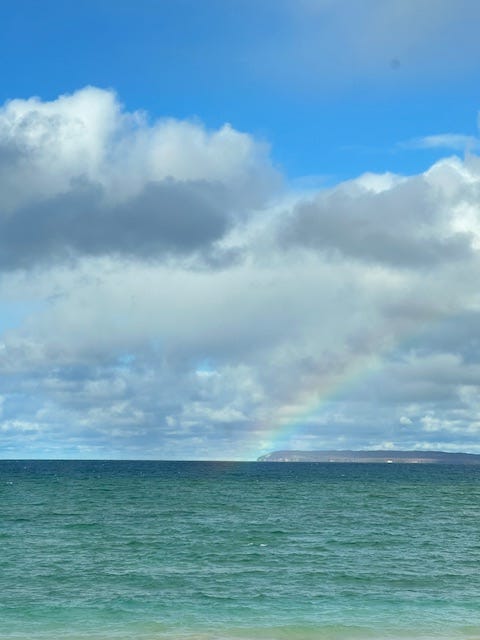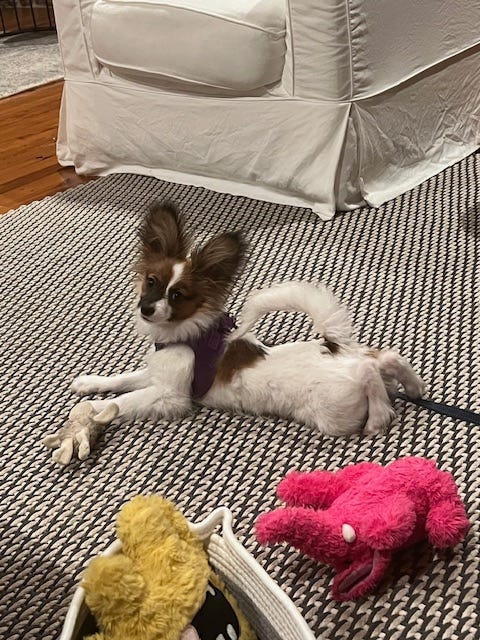The Quiet Gift of Seeing Without Labeling
Discover how pausing before labeling—yourself or others—opens space for understanding, compassion, and calm.
After every storm, the light returns—softer, clearer, and free of labels.
The Quiet Gift of Seeing Without Labeling
Discover how pausing before labeling—yourself or others—opens space for understanding, compassion, and calm.
The Instant of Judgment
I’ve spent most of my life learning to be less judgmental. It hasn’t been easy.
My profession demanded judgment—deciding what the real problem was, whether it was solvable, who could solve it, and how best to proceed.
Years ago, at a planning retreat for the Michigan Modernization Service, thirty of us—consultants, HR professionals, and engineers—took the Myers-Briggs personality test (a framework that identifies how people prefer to gather information and make decisions).
Twenty-nine people in the room scored INTJ.
The Myers-Briggs framework calls this an INTJ tendency—intuitive, analytical, and decisive—traits that make for strong consultants but can over-rely on judgment.
Only one—our program leader—had a different combination that included sensing. I’ve never forgotten this result.
That moment told me something about how we were wired. As consultants and engineers, we valued logic, structure, and assessment.
Judgment wasn’t just natural; it was rewarded. Sound judgment was the backbone of our work.
But in the rest of life, judgment is not so simple.
Judgment names. Presence notices.
And when we notice without rushing to name, compassion quietly enters the room.
Why We Judge
Judgment is part of being human. It begins as protection, an instinctive way to organize experience so we can feel safe.
Our brains are wired to decide quickly: friend or foe, safe or risky, sound or irrelevant, kind or uncaring.
It’s efficient, even necessary when we’re solving problems or leading others. Sound judgment keeps teams on track, prevents costly mistakes, and helps us navigate the thousand choices each day demands.
But outside of those professional or safety moments, judgment can slip its boundaries.
I’ve learned that most judgment begins as a moment of discomfort we try to explain too quickly.
It becomes a habit, a lens we don’t even realize we’re looking through.
We label to make sense of things. It helps us feel momentarily in control. Yet each label shortens the story.
Once we name a person or situation, we stop being curious. The mind closes the file: I already know who she is… I’ve seen this before… I know how this ends.
Presence, on the other hand, has the patience to keep the file open. It asks me to pause, to notice what’s unfolding before naming it.
I can recognize tiredness behind sharp words, fear behind control, or insecurity behind arrogance.
It’s not about excusing behavior; it’s about seeing the complete human picture before deciding what it means.
When I’m present, truly present, I see people as more than their first sentence or single action.
And when I notice without rushing to name, compassion and understanding quietly enter the room.
What Presence Does Instead
Presence isn’t passive. It’s the most active form of kindness I know.
Presence slows the mind just enough to see the whole picture.
Presence refines discernment; it doesn’t erase it. You still make a call—just a wiser one.
Presence keeps people human. We recognize tiredness behind sharp words, fear behind control, and insecurity behind arrogance.
In meetings, presence sounds like: “Tell me more about what you’re seeing.”
At home, it looks like taking a breath before responding.
With ourselves, it feels like: I’m having a reaction; I don’t need to be ruled by it.
Practices to Loosen Judgment (Try one this week)
Pause before you decide. One full breath. Let the first label drift by. Allow your initial judgment to pass.
Ask, don’t assume. Swap “Why would they…” for “I wonder what’s going on for them.” “What brought them to this choice?” “How did this happen?”
Notice your word choice. When you think of someone as lazy, rude, selfish, or unkind, look for the fatigue, fear, anger, or grief underneath.
Return to your senses. Feel your feet, hear the room, soften your jaw. Presence lives in the body before it lives in the mind.
Use a bridging line.
Work: “Before we land this, what might I be missing?”
Home: “I want to understand—what’s the hard part for you right now?”
Micro-habit: Put a small dot sticker on your laptop or phone. Every time you see it, practice one breath before you label.
Presence helps us withhold judgment where love is needed—but it also gives us courage to stand firm where wrong must be named.
A Faith-Based Thought
Even with practice, I found one question kept surfacing: what gave me the right to judge at all?
In my life, the most important conclusion I ever reached about judgment and my propensity to judge was a faith-based one.
In an era when accepted conclusions, practices, and ways of living have been turned upside down in many cases, I needed relief from the judge inside me.
Did I need to analyze the heart and mind of every person who was different from me, my closest friends, and my experiences? No. The answer on reflection was quite clear.
All God’s children.
I have no business attempting to understand any person’s relationship with their creator. Their discussion lies with him.
I love them and their differences as I love any other person who is similar to me.
Do I condone hate and violence? No. But I am pretty much helpless to stop it.
I can affect the systems that produce these people.
Presence doesn’t blind us to evil; it reminds us to meet it with both courage and clarity.
Still, evil exists in this world. Some wounds run deep.
Whether it’s born of nature or nurture is a question for another day.
Closing Reflection
Judgment builds walls; presence opens windows.
Presence doesn’t ask us to stop judging—it asks us to judge wisely. To see clearly without condemning, and to stand firm without forgetting compassion.
Evil still exists in this world, and presence doesn’t turn away from it. It helps us meet it with courage, clarity, and faith.
Today, choose noticing over naming—with one person, one meeting, one moment. See what changes.
I am noticing as I write, my puppy Percy’s breathing slows beside me—no judgment, no story, just trust. Presence can be that simple.
Where does judgment show up most for you—and what helps you pause before you name it?
If you’re willing, share one bridging line you’ll try this week.
With gratitude for how you live your values,
— Susan
Until next week—keep doing what matters most.
If this reflection helped you pause before labeling, please share it with someone who might need the same reminder today.
ValuesCrafting grows when readers like you share thoughtful, practical ways to live our values.
Just a reminder that I share short reflections on values, life, and Percy several times a week in Substack Notes—along with posts from other writers whose work I admire. It’s a more spontaneous space, and I’d love to see you there. Check out Notes for all the latest.
Your presence here means more than I can say. Thank you for being part of ValuesCrafting. Every time you read, reflect, and act on these ideas, you’re helping create a world where values guide actions—and that’s something worth sharing.




